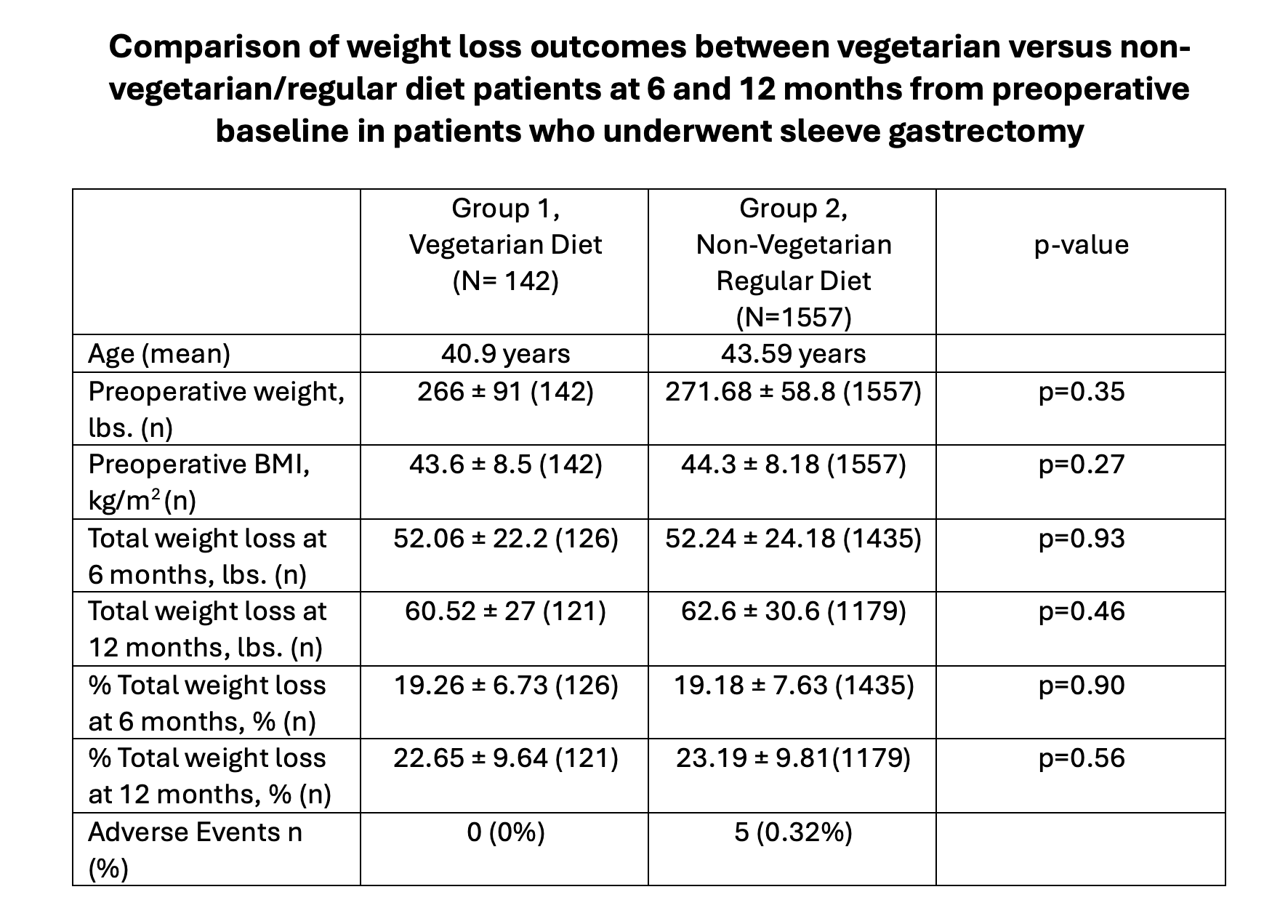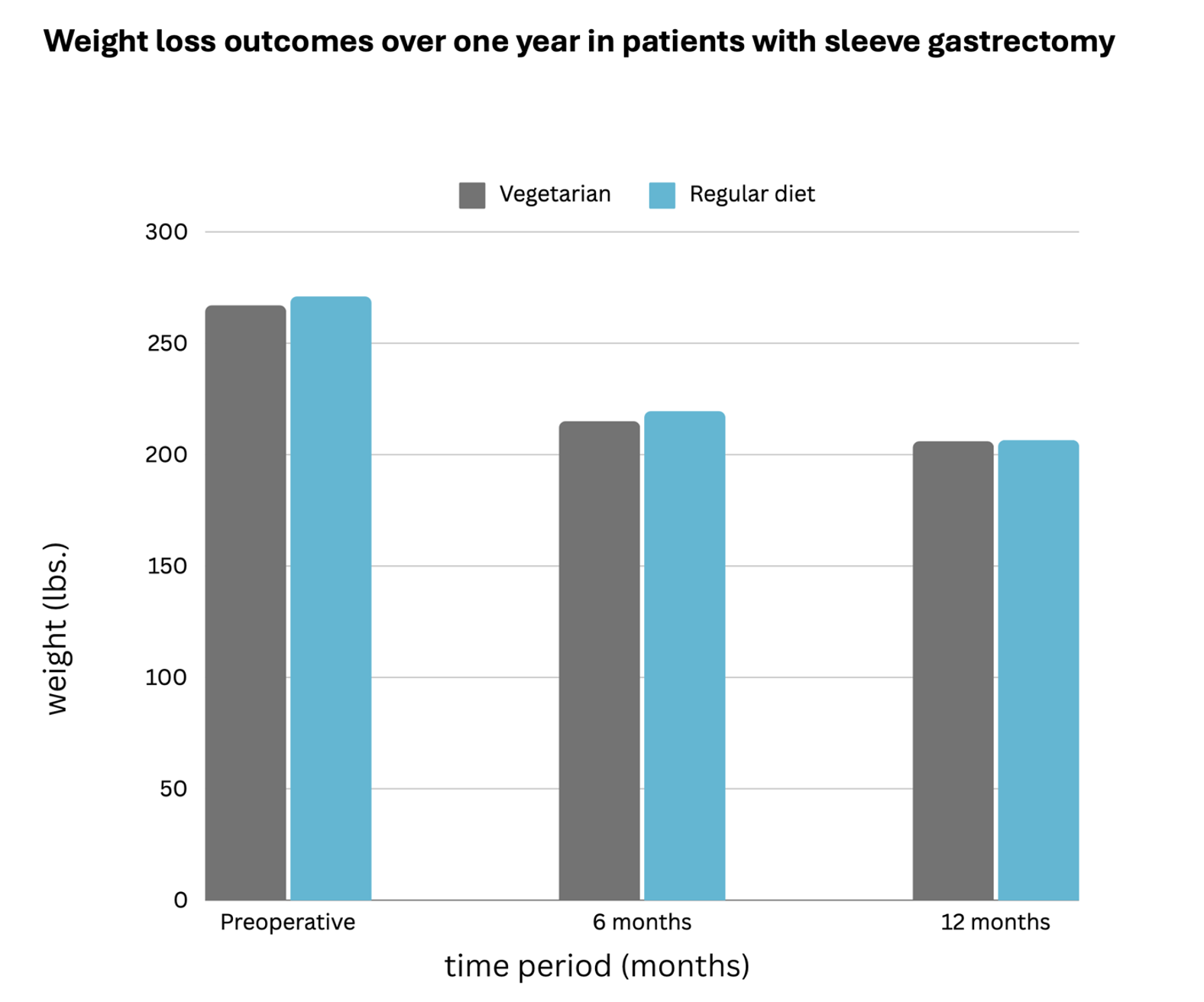Sunday Poster Session
Category: Diet, Nutrition, and Obesity
P0566 - Effect of Diet on Weight Loss Outcomes in Patients After Bariatric Therapies
Sunday, October 26, 2025
3:30 PM - 7:00 PM PDT
Location: Exhibit Hall

Vishal Chandel, MD
Brigham and Women's Hospital, Harvard Medical School
Boston, MA
Presenting Author(s)
Vishal Chandel, MD1, Neel Chandel, MD2
1Brigham and Women's Hospital, Harvard Medical School, Boston, MA; 2West Virginia University Charleston Area Medical Center, Charleston, WV
Introduction: Sleeve gastrectomy (SG) has emerged to be the most common bariatric intervention for weight loss in last decade. In some reports, vegetarianism has been reported to be associated with lower risk of diabetes, heart disease and all-cause mortality. Whether this dietary influence influences any weight loss outcomes in population remains to be seen.
This study aims to compare weight loss profiles between vegetarian diet versus regular non-vegetarian diet patients who underwent SG over a year and evaluate whether there is any difference in outcomes due to dietary patterns.
Methods: This is a retrospective study of patients who underwent SG at our institute from 2018-2024. Patients were followed for a period of one year from LSG for weight loss outcomes. Demographics, dietary patterns, AEs, and weight profiles were collected. The primary outcome was total weight loss (TWL) and %TWL comparisons between patients who took vegetarian diet versus regular non-vegetarian diet. Secondary outcomes included comparison of AE. A Fisher exact test was used to compare the AE rate, and a student t-test was used for weight comparisons.
Results: 142 vegetarian (group 1) and 1557 non-vegetarian diet (group 2) patients were included who underwent LSG. Baseline characteristics were similar between groups. Mean preoperative weight (pounds) was 266 ± 91 and 271.68 ± 58.8 in Groups 1 & 2, while BMI (Kg/m2) was 43.6 ± 8.5 and 44.3 ± 8.18. Total weight loss (TWL) (pounds) between Group 1 and 2 at 6 and 12 months were (52.06 ± 22.2 and 52.24 ± 24.18, p=0.93) and (60.52 ± 27 and 62.6 ± 30.6, p=0.46) respectively. %TWL in groups 1 and 2 were (19.26 ± 6.73 and 19.18 ± 7.63, p=0.90) and (22.65 ± 9.64 and 23.19 ± 9.81, p=0.56) at 6 and 12 months. The AE rate in the vegetarian group (0%) was lower than the non-vegetarian group (0.32%) but not statistically significant. There was no significant difference in weight loss at 6 months and 1 year. Weight comparisons between preoperative weight and 6- or 12-months weight was statistically significant in either group (p< 0.0001).
Discussion: Dietary behavior does not influence change in outcomes after bariatric therapy with SG. Lower adverse events were seen in vegetarian patients without any significant difference. Further studies of dietary behavior in larger populations with surgical as well as endoscopic bariatric therapies can shed more light into the influence of dietary behavior and weight loss outcomes.

Figure: Comparison of weight loss outcomes between vegetarian versus non-vegetarian/regular diet patients at 6 and 12 months from preoperative baseline in patients who underwent sleeve gastrectomy

Figure: Weight loss outcomes over one year in patients with sleeve gastrectomy
Disclosures:
Vishal Chandel indicated no relevant financial relationships.
Neel Chandel indicated no relevant financial relationships.
Vishal Chandel, MD1, Neel Chandel, MD2. P0566 - Effect of Diet on Weight Loss Outcomes in Patients After Bariatric Therapies, ACG 2025 Annual Scientific Meeting Abstracts. Phoenix, AZ: American College of Gastroenterology.
1Brigham and Women's Hospital, Harvard Medical School, Boston, MA; 2West Virginia University Charleston Area Medical Center, Charleston, WV
Introduction: Sleeve gastrectomy (SG) has emerged to be the most common bariatric intervention for weight loss in last decade. In some reports, vegetarianism has been reported to be associated with lower risk of diabetes, heart disease and all-cause mortality. Whether this dietary influence influences any weight loss outcomes in population remains to be seen.
This study aims to compare weight loss profiles between vegetarian diet versus regular non-vegetarian diet patients who underwent SG over a year and evaluate whether there is any difference in outcomes due to dietary patterns.
Methods: This is a retrospective study of patients who underwent SG at our institute from 2018-2024. Patients were followed for a period of one year from LSG for weight loss outcomes. Demographics, dietary patterns, AEs, and weight profiles were collected. The primary outcome was total weight loss (TWL) and %TWL comparisons between patients who took vegetarian diet versus regular non-vegetarian diet. Secondary outcomes included comparison of AE. A Fisher exact test was used to compare the AE rate, and a student t-test was used for weight comparisons.
Results: 142 vegetarian (group 1) and 1557 non-vegetarian diet (group 2) patients were included who underwent LSG. Baseline characteristics were similar between groups. Mean preoperative weight (pounds) was 266 ± 91 and 271.68 ± 58.8 in Groups 1 & 2, while BMI (Kg/m2) was 43.6 ± 8.5 and 44.3 ± 8.18. Total weight loss (TWL) (pounds) between Group 1 and 2 at 6 and 12 months were (52.06 ± 22.2 and 52.24 ± 24.18, p=0.93) and (60.52 ± 27 and 62.6 ± 30.6, p=0.46) respectively. %TWL in groups 1 and 2 were (19.26 ± 6.73 and 19.18 ± 7.63, p=0.90) and (22.65 ± 9.64 and 23.19 ± 9.81, p=0.56) at 6 and 12 months. The AE rate in the vegetarian group (0%) was lower than the non-vegetarian group (0.32%) but not statistically significant. There was no significant difference in weight loss at 6 months and 1 year. Weight comparisons between preoperative weight and 6- or 12-months weight was statistically significant in either group (p< 0.0001).
Discussion: Dietary behavior does not influence change in outcomes after bariatric therapy with SG. Lower adverse events were seen in vegetarian patients without any significant difference. Further studies of dietary behavior in larger populations with surgical as well as endoscopic bariatric therapies can shed more light into the influence of dietary behavior and weight loss outcomes.

Figure: Comparison of weight loss outcomes between vegetarian versus non-vegetarian/regular diet patients at 6 and 12 months from preoperative baseline in patients who underwent sleeve gastrectomy

Figure: Weight loss outcomes over one year in patients with sleeve gastrectomy
Disclosures:
Vishal Chandel indicated no relevant financial relationships.
Neel Chandel indicated no relevant financial relationships.
Vishal Chandel, MD1, Neel Chandel, MD2. P0566 - Effect of Diet on Weight Loss Outcomes in Patients After Bariatric Therapies, ACG 2025 Annual Scientific Meeting Abstracts. Phoenix, AZ: American College of Gastroenterology.
